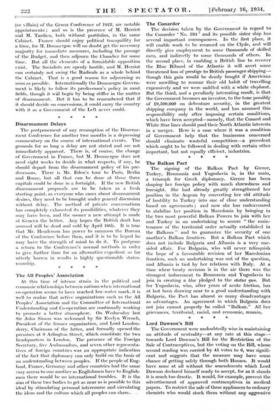The Balkan Pact The signing of the Balkan Pact by
Greece, Turkey, Roumania and Yngoslavia is, in the main, a triumph for Greek diplomacy. Greece has been shaping her foreign policy with much shrewdness and foresight. She had already greatly strengthened her position in the Aegean by converting her old attitude of hostility to Turkey into one of close Understanding based on agreements ; and now she has endeavoured to stabilize her position in Macedonia by bringing in the two most powerful Balkan Powers to join with her and Turkey in an undertaking to secure "the main- tenance of the territorial order actually established in the Balkans" and to guarantee the security of one another's Balkan frontiers. But a Balkan Pact which does not include Bulgaria and Albania is a very one- sided affair. For Bulgaria, who will never relinquish the hope of a favourable revision of her Macedonian frontiers, such an undertaking was out of the question, and Albania is tied by her relations with Italy. At a time when* treaty revision is in the air there was the strongest inducement to Roumania and Yugoslavia to join in creating a bloc pledged to the status quo. But for Yugoslavia, who, after years of acute friction, has at last been drawing near to a good understanding with Bulgaria, the Pact has almost as many. disadvantages as advantages. An agreement in which Bulgaria does not join cannot properly be called "Balkan." All her grievances, territorial, racial, and economic, remain.








































 Previous page
Previous page